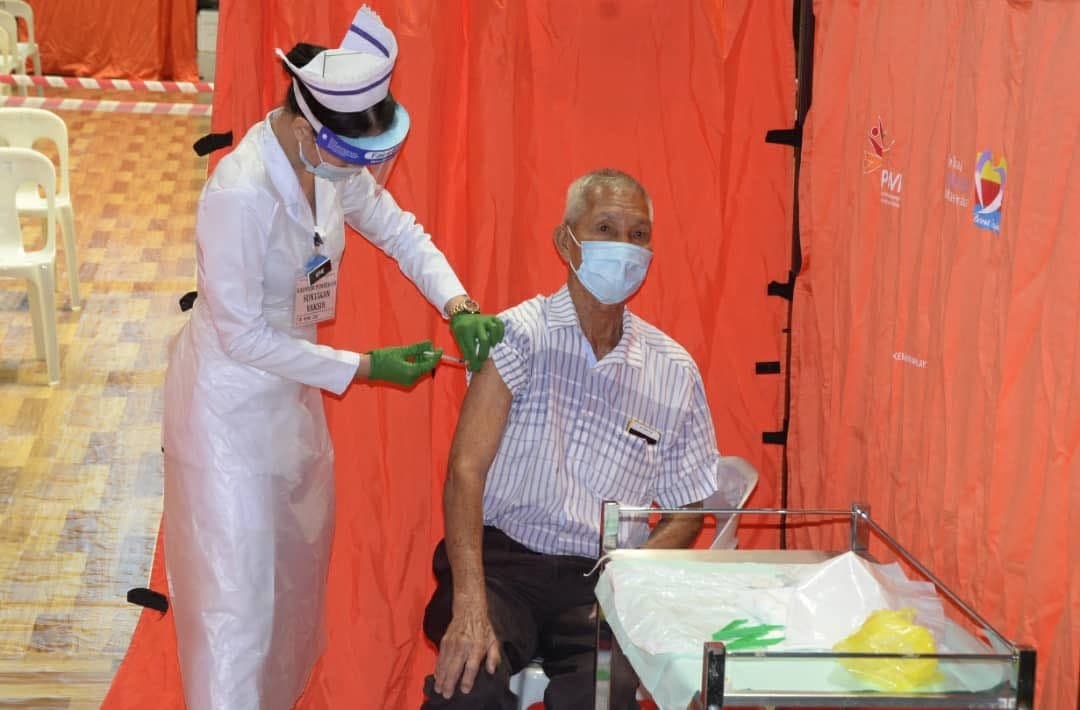The Covid-19 Immunisation Task Force (CITF) appears to have lost sight of the main purpose of the national vaccination programme – which is to reduce hospitalisation and deaths from the virus that rose exponentially in the past month, not infections.
Shopping centres have announced plans to launch their own Covid-19 vaccine rollouts for retail workers from the end of this month at RM50 charge per person for two doses of vaccines – Pfizer-BioNTech or Sinovac – that are already provided for free in the National Covid-19 Immunisation Programme (PICK).
The RM50 price for vaccines, which Malaysian taxpayers have already paid for, is opaque and raises lots of questions. ProtectHealth Corporation – a Ministry of Health (MOH) owned company whose board includes the Health director-general and MOH secretary-general – and the Ministry of Domestic Trade and Consumer Affairs (KPDNHEP) – which appears to oversee the so-called “economic frontliners vaccination programme” for the retail sector – have denied collecting payments for the vaccine rollouts by shopping centres.
So, what are shopping centres collecting the money for? If ProtectHealth is already covering the cost of vaccine administration by paying vaccinators RM14 per dose administered, is the RM50 fee to cover the cost of venue rental for setting up vaccination centres (PPVs) at malls? Even then, this seems excessive.
Pharmaniaga Bhd, on the other hand, is expected to immediately deliver Sinovac’s coronavirus vaccines to state governments and the private sector, despite Vaccine Minister Khairy Jamaluddin’s previous assertion that the federal government’s order of 12 million doses must be fulfilled in its entirety – estimated end July – before Pharmaniaga begins work on other orders.
With Health Minister Dr Adham Baba and Senior Defence Minister Ismail Sabri Yaakob’s latest statement yesterday (Pharmaniaga is controlled by the Armed Forces Fund Board) on Pharmaniaga’s vaccine distribution to states and companies running parallel with PICK, it is unclear if Pharmaniaga can fully deliver the federal government’s order by the end-July target.
Why is CITF diverting Covid-19 vaccines away from PICK when we have inoculated just a fraction of the 9.4 million targeted individuals who face the highest risk of developing severe disease or dying from Covid-19 – the elderly, people with comorbidities, and the disabled community?
As of May 31, just about two million people have received at least one dose of the vaccine. Assuming that about a million of these individuals are frontline workers from the first phase of PICK and young adults who signed up for the AstraZeneca-Oxford jab (numbers are likely higher), that means Malaysia has vaccinated only a million high-risk individuals, or 11 per cent of the 9.4 million targeted.
CITF has yet to publish statistics on the number of high-risk people who have received Covid-19 vaccines so far.
In the month of May alone, 1,290 people lost their lives to Covid-19 in Malaysia, nearly triple the 471 fatalities recorded in the whole of last year. Although an increasing number of younger adults are dying from Covid-19 in the new wave of the Malaysian epidemic, the elderly remain the primary victims.
About 74 per cent of 1,290 people who died from Covid-19 last month, or 955 individuals, were aged 60 years and above. Nearly nine in 10 victims had underlying health conditions, 75 per cent of whom were aged 60 or older.
Dozens of people have been dying from Covid-19 every day in Malaysia in the past three weeks. When hospitals and intensive care units (ICUs) are full, our vaccination strategy should focus on reducing the number of people with Covid-19 requiring hospital or critical care, not to cut infections.
People who receive vaccination can still contract Covid-19 and possibly infect others, but all approved coronavirus vaccines prevent severe disease and death.
Chasing illusory single-digit daily infections – or even triple-digit infections at this point – is an impossible endeavour that will take at least six months or even a year, depending on how fast we can inoculate two-thirds of our adult population. As of yesterday, only about 8 per cent of Malaysia’s adult population has received at least one dose.
If CITF is now changing its vaccination strategy to focus on working adults to prevent further economically devastating lockdowns, then CITF should make this clear. In a scenario with limited resources – vaccine supply, manpower to run PPVs, and outreach efforts – there must be priority groups in whichever strategy, whether it’s to protect the most vulnerable or to keep the economy going.
The UK recorded zero new Covid-19 deaths yesterday for the first time since July 2020. This achievement came after the UK took about six months to vaccinate nearly 75 per cent of the adult population, or over 39 million people, with at least one vaccine dose.
The UK’s coronavirus vaccination programme, which opened up in phases according to age, hit its target of offering a first jab to all those in top priority groups – those aged 50 or older as well as people in high-risk categories – before April 15.
England and Scotland have now started offering first vaccines to people aged 30 and above, while Northern Ireland and Wales have begun vaccinating over-18s. Due to the emergence of the variant first discovered in India, renamed the “Delta” variant, England is accelerating second vaccine doses to adults aged 50 and above.
The UK has the benefit of most residents, including non-nationals, being registered with its NHS, making it easy to reach out to senior citizens for Covid-19 vaccination. Malaysia, on the other hand, has serious challenges in providing vaccine access to the elderly, many of whom live in the community with their families or on their own instead of care homes.
The over 62,000 no-shows at Covid-19 vaccination appointments in Kedah, Pahang, Kelantan, Perak, Negeri Sembilan, Melaka, Perlis, and Terengganu – attributed to lack of transport to PPVs and not checking the MySejahtera app for appointment dates – illustrate the immense difficulty in reaching the elderly population.
But this does not mean the government should abandon senior citizens and switch focus to easier targets. If the elderly won’t come to us, then we must go to them, by hook or by crook. Khairy has displayed a keen knowledge on Covid-19 and public health principles. So I hope he wrests full control of the national vaccination programme and focuses the country’s efforts on protecting the vulnerable.

Boo Su-Lyn is CodeBlue editor-in-chief. She is a libertarian, or classical liberal, who believes in minimal state intervention in the economy and socio-political issues.








